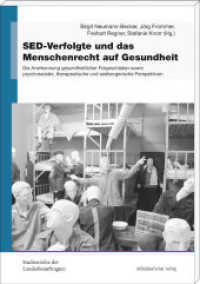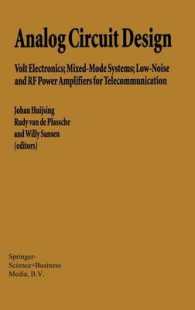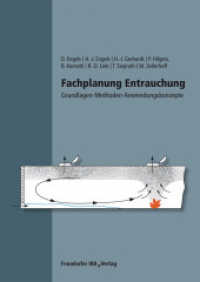- ホーム
- > 洋書
- > 英文書
- > Science / Mathematics
Full Description
The second edition volume expands on the previous edition with new and updated chapters on the latest methods used for studying presentation of antigenic peptides produced in the standard processing pathways for MHC class I and II molecules. The new chapters cover topics such as biochemical and cellular approaches to study the impact of the endoplasmic reticulum aminopeptidases; techniques to monitor MHC class I synthesis and degradation; approaches to measure processing efficacy; description of different assays measuring MHC recycling; and protocols to produce MHC class II tetramers. Written in the highly successful Methods in Molecular Biology series format, chapters include introductions to their respective topics, lists of the necessary materials and reagents, step-by-step, readily reproducible laboratory protocols, and tips on troubleshooting and avoiding known pitfalls. Cutting-edge and comprehensive, Antigen Processing: Methods and Protocols, Second Edition is a valuable tool for both novice and expert researchers interested in studying antigen processing and venturing out further into this evolving field.
Contents
Purification of Large Cytosolic Proteases for In Vitro Assays: 20S and 26S Proteasomes.- Analysis of Proteasome Generated Antigenic Peptides by Mass Spectrometry.- Trimming of MHC Class I Ligands by ERAP Aminopeptidases.- Peptide Trimming for MHC Class I Presentation by Endoplasmic Reticulum Aminopeptidases.- Testing the Impact of Protease Inhibitors in Antigen Presentation Assays.- In Vitro Studies of MHC Class I Peptide Loading and Exchange.- Measuring Synthesis and Degradation of MHC Class I Molecules.- Biochemical Analysis of Naturally Processed Antigenic Peptides Presented by MHC Class I Molecules.- A SIINFEKL Based System to Measure MHC Class I Antigen Presentation Efficiency and Kinetics.- Purification and Identification of Naturally Presented MHC Class I and II Ligands.- Identification of MHC Ligands and Establishing MHC Class I Peptide Motifs.- Quantitating MHC Class I Ligand Production and Presentation using TCR-LikeAntibodies.- Identifying Antigens Recognized by Cytolytic T Lymphocytes on Tumors.- A Flow Cytometry-Based Approach to Unravel Viral Interference with the MHC Class I Antigen Processing and Presentation Pathway.- Evaluating CD8+ T Cell Responses In Vitro.- Recombinant Poxviruses: Versatile Tools for Immunological Assays.- Monitoring the Intracellular Routing of Internalized Antigens by Immunofluorescence Microscopy.- Monitoring MHC Ubiquitination by MARCH Ubiquitin Ligases.- Monitoring MHC-II Endocytosis and Recycling using Cell-Surface Protein Biotinylation-Based Assays.- Monitoring Protein Endocytosis and Recycling using FACS-Based Assays.- In Vitro Digestion with Proteases Producing MHC Class II Ligands.- Assembly, Intracellular Transport and Release of MHC Class II Peptide Receptors.- Pulse-Chase Analysis for Studies of MHC Class II Biosynthesis, Maturation, and Peptide Loading.- Studying MHC Class II Peptide Loading andEditing In Vitro.- Monitoring Antigen Processing for MHC Presentation via Macroautophagy.- Identification of Human Antigen-Specific CD4+ T-Cells with Peptide-MHC Multimer Technologies.- Production of Antigen Specific Human CD4+ T Cell Lines and Clones.- Monitoring Dendritic Cell Activation and Maturation.- Studying MHC Class II Presentation of Immobilized Antigen by B Lymphocytes.- Analyzing Antigen Recognition by Natural Killer T Cells.








